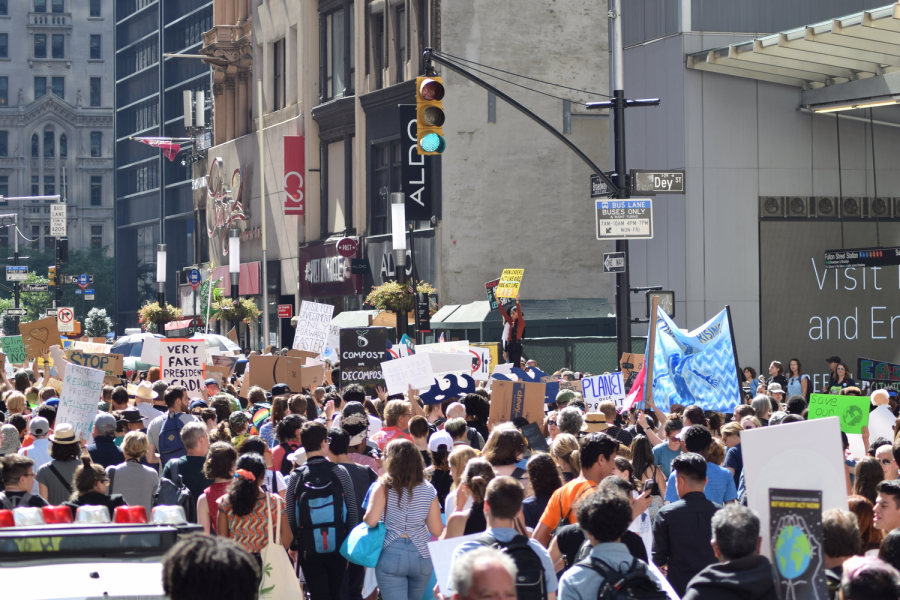New York Becomes the Second State to Ban Single Use Plastic Bags
New York Governor Andrew Cuomo signed a law earlier this year that banned single use plastic bags which will take effect in March 2020.
New York City students gather in Manhattan at a rally advocating for global changes in climate regulations.
With growing concerns about climate change, Governor Andrew Cuomo signed a bill earlier this year in which New York would become the second state, following California, to ban plastic bags. As the movement for sustainability increases, climate activists are taking action to save the planet. In September 2019, climate strikes organized by Greta Thunberg, a 16-year-old Swedish activists, took place around the world. Some 250,000 people attended the climate strike in New York, and following the strike, Thunberg spoke at the United Nations Climate Action Summit to organize sustainability and partnerships at a global level. Although many people believe that their actions are too small to make a difference, even simple tasks can help support the cause.
One of these tasks is reducing the use of single-use plastics. Single-use plastics are all around us, and we interact with them on a daily basis. Such examples include cellophane wrappers on products, plastic straws, and plastic grocery bags. Plastic grocery bags are heavily used because of their convenience and availability. Although few people think about the impacts of these bags on the environment, the effects can be seen in our animals, land, and waters. Though this does not affect us directly—the impacts will be seen soon.
According to the Center for Biological Diversity, the average American household uses 1,500 plastic bags every year, totaling 100 billion bags used yearly as a country. One Bronx Science student, who wished to remain anonymous, said, “In my family, we tend to go shopping once or twice a week, and I tend to use whatever bags the store offers, which is normally plastic bags.” At the moment, it may not seem like a lot to use four or five bags per grocery trip, but one trip a week will easily add up to over 250 bags in a year.
The push for the elimination of single-use plastics is growing substantially high, as the North Pacific Garbage Patch measures a whopping 1.6 million square kilometers, which is roughly double the size of Texas. If the garbage patch was its own country, it would be ranked as the 26th largest in the world.
Although we cannot be rid of all plastics, recycling can play a big part in sustainability efforts and reducing the plastic waste that ends up in our landfills. Governor Cuomo’s plan is to eliminate plastic bags from large corporations but to allow smaller businesses to continue using them. In addition, the law states that counties will have the ability to opt for a five cents fee per paper bags to further increase sustainability and cut back on dependability on paper products, which will reduce deforestation.
“In my family, we tend to go shopping once or twice a week, and I tend to use whatever bags the store offers, which is normally plastic bags.”
One simple way to cut down on plastic bag usage is to invest in a reusable shopping bag, which are usually cheap and provides some customers discounts for their use in certain stores. These bags are also sturdier and made to last a long time, no matter the wear and tear. As stated by this anonymous student, “I don’t believe this will be too much of an issue. Reusable bags are a lot more durable than plastic or paper.” This is miles better than plastic bags, eliminating the need for double bagging.
The impact of the DeBlasio’s plastic bag ban will be felt by corporations and New Yorkers alike. While thousands of companies use plastic bags for convenience, some big wholesale corporations have eliminated the need for bags by reusing large boxes from shipping to help customers transport their purchases from the store to their cars. This is a cost alternative option that more stores may start to use when the ban takes effect next year.
It is important to know the exceptions to the bag ban. Listed on the bill, single use plastics which are used for meat and poultry items will not be affected. In addition, sliced or prepared foods will also still use plastic bags.
Plastic usage is an ongoing global crisis that can be remedied with the passing of the plastic bag ban in New York. By becoming the second state to pass the law, California and New York are setting the precedent for a future with limited plastic usage and a more sustainable society. With the sheer amount of alternative methods, finding even more ways to reduce our use of plastic bags should be an almost effortless task.
Russell Kwong is a Copy Chief Editor for 'The Science Survey.' In his second year of journalism, he enjoys reading 'The New York Times' online to learn...
Gazi Fuad is a Chief Photographer & Photo Editor for the school yearbook ‘The Observatory.’ Outside of school, he is part of a team of photographers....

